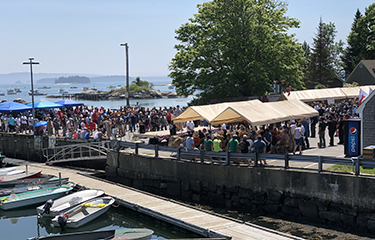Maine’s lobster season has slow start as industry faces challenges

The 2019 lobster season in the U.S. state of Maine has been off to a slow start, partially the result of the industry facing a number of challenges,
According to a story in the Associated Press, Maine lobstermen are reporting that their season so far hasn't picked up as quickly as the past few years. Typically, the season is in full swing by July, but so far the catch has remained relatively stagnant.
The exact reason for the slow start is unclear, with some citing a colder-than-usual spring as a probable cause. Despite the slower start, average prices have remained relatively stable.
The sluggish opening to the season has had one major benefit for fishermen, as they’ve been able to conserve and store up more bait. The industry was facing a potential bait crisis after the New England Fisheries Management Council slashed the state’s herring quota by 70 percent. Herring has historically been the bait of choice for lobstermen, who use tens of millions of pounds of the fish in their traps.
The issue has gained enough attention that companies are working on finding alternative sources of bait to offset the potential shortage. Cooke Aquaculture USA – which operates a number of salmon farms in the state, among other things – recently gained approval from the Maine Department of Marine Resources to use whole blackbelly rosefish from Uruguay as a bait in traps.
Maine has also managed to snag extra menhaden quota – a fish known locally to the state as pogy – which has helped offset some of the shortage of herring. State officials petitioned the Atlantic States Marine Fishery Management Council for extra quota after the fish appeared to be still abundant in the state’s waters.
The season's strange beginning has allowed fishermen to save costs on fuel, and bait, Maine Lobstermen’s Association Executive Director Patrice McCarron told the Associated Press.
“Guys have been able to come into the fishery slow, save bait resources, fuel resources for what they’re really going to need it,” McCarron said.
That means some freezers are full of bait, keeping some of the pressure off. However, the industry is facing another challenge as NOAA considers requiring the industry to reduce the amount of vertical lines used for lobster traps by 50 percent. The reductions are intended to help protect the critically endangered North Atlantic right whale.
On 21 July, lobstermen from across the state – in addition to three of the state’s four congressional representatives and Maine Governor Janet Mills – met in Stonington Maine to push back against the regulations. The governor has already threatened to defy the new rules, and the congressional delegations have written a letter to U.S. President Donald Trump, urging him to intervene directly.
A major point of contention for lobstermen, according to lobsterman Julie Eaton, is a lack of evidence that Maine’s industry is impacting the whales. The regulations would also require lobstermen to have more traps per vertical line, something that makes the fishery more dangerous for smaller boats.
“NOAA knows that not one right whale has been proven to have been entangled in Maine rope in many years and the new proposed regulations would only cause extreme danger to our lobstermen,” Eaton said.
Impacts to the lobster industry could have impacts further afield in the state. The industry took in USD 485 million (EUR 434.8 million) in 2018.
“Here’s the deal, if we can’t make a living then we can’t buy vehicles, we don’t fix our homes which impacts contractors, we don’t spend as much at the grocery store,” Eaton said. “When a large community such as this with more than 4,800 lobster license holders is impacted the ripple effect will be felt far and wide.”
U.S. Representative Chellie Pingree, who represents the southern half of the state and who was in attendance the event, said that while protecting right whales is important, the risks need to be considered.
“I am concerned however that NOAA’s one-size-fits-all risk reduction tool may not be the best fit for Maine’s lobster industry, and could potentially endanger the lives and livelihoods of Maine lobstermen,” she said. “Before we ask them to make such significant and costly changes, we need more information about the risk factors to right whales to ensure that reducing lines will actually keep them from harm.”
Photo courtesy of The Knight Canney Group






Share